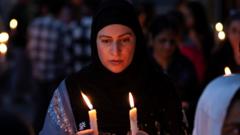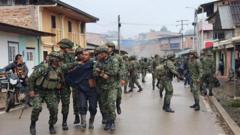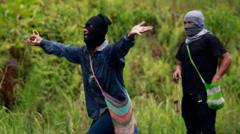Recent violence targeting Kashmiri individuals, sparked by a fatal attack in Kashmir, has led to assaults and intimidation of residents in various Indian cities. Many have expressed feelings of insecurity, with reports of harassment from right-wing groups and even peer-to-peer hostility. The situation has sparked debates around civil liberties amid ongoing security crackdowns in Kashmir.
Kashmiris Face New Wave of Violence and Intimidation Amid Ongoing Conflict

Kashmiris Face New Wave of Violence and Intimidation Amid Ongoing Conflict
Following a deadly attack in Kashmir, members of the Kashmiri community in India are experiencing increased violence and harassment, fueling fears for their safety and sense of belonging.
In recent days, the Kashmiri community has found itself increasingly threatened and vulnerable following a tragic attack that claimed 26 lives in Pahalgam, Kashmir. The attack, attributed to militant forces, has reignited persistent tensions in a region already fraught with fears and insecurity. This has particularly affected Kashmiri vendors who have long established ties in other parts of India.
Shabir Ahmad Dar, a pashmina shawl seller in Mussoorie, has been selling his goods for over two decades, but says recent events have radically shifted his perception of safety. After being assaulted by a group of right-wing activists who mistakenly held him accountable for the recent killings, Dar and others have begun to feel that their cultural identity is a stigma rather than a source of pride. In a disturbing instance captured on video, attackers hurled abuses and threatened them while ransacking their stall, an act that has since gone viral, highlighting the vulnerability of Kashmiri individuals outside their home territory.
The incident has sparked widespread outrage, and police did intervene to arrest the attackers; however, the assailants were released shortly after with minimal repercussions. Dar has since left Mussoorie along with many other Kashmiri shawl sellers, stating, "But we are too scared to go back," demonstrating a troubling climate of fear that forces individuals back to a region that many see as increasingly unsafe.
As tensions escalate, students from Kashmir studying in cities like Punjab report harassment by classmates and community members. One nursing student described how she was accused of being a terrorist and subsequently had to flee back to Kashmir. The collective experience has underscored a rising trend of hostility towards the Kashmiri identity even among those who have long inhabited spaces outside their home region.
The region of Kashmir finds itself amidst a crackdown by Indian security forces, which have intensified since the attack, leading to arrests and demolitions within local communities. Many civilians are raising concerns regarding collective punishment, indicating that innocent families are bearing the brunt of security responses targeting alleged militants. Jammu and Kashmir Chief Minister Omar Abdullah acknowledged the challenge of distinguishing innocent civilians from alleged perpetrators amidst rising anger and fear.
Critics of the security measures argue that the identity of Kashmiris is inherently viewed with suspicion in a climate where communal tensions are easily inflamed. An Indian editor notes that, while the region has seen some stability measures since the revocation of its special status in 2019, the impression remains that local populations are instantly considered guilty, perpetuating a cycle of fear and isolation.
After the attack in Pahalgam, vigils and protests emerged across Kashmir. Many locals, including writers and community activists, echoed sentiments of discontent with the wider societal reactions towards them. Some believe that Kashmiris are uniquely positioned as targets of hatred, especially within a broader narrative that often places blame on their identity.
As families in Kashmir pieced lives together amid ongoing strife, individuals like Mohammad Shafi Dar, who lost his home to security operations, encapsulated the plight of many: "We lost everything. We don't even have utensils to cook food." The deeper implications of these security responses, combined with targeted violence against Kashmiris, suggest an urgent need for dialogue and understanding in order to prevent further marginalization of the Kashmiri community.
Shabir Ahmad Dar, a pashmina shawl seller in Mussoorie, has been selling his goods for over two decades, but says recent events have radically shifted his perception of safety. After being assaulted by a group of right-wing activists who mistakenly held him accountable for the recent killings, Dar and others have begun to feel that their cultural identity is a stigma rather than a source of pride. In a disturbing instance captured on video, attackers hurled abuses and threatened them while ransacking their stall, an act that has since gone viral, highlighting the vulnerability of Kashmiri individuals outside their home territory.
The incident has sparked widespread outrage, and police did intervene to arrest the attackers; however, the assailants were released shortly after with minimal repercussions. Dar has since left Mussoorie along with many other Kashmiri shawl sellers, stating, "But we are too scared to go back," demonstrating a troubling climate of fear that forces individuals back to a region that many see as increasingly unsafe.
As tensions escalate, students from Kashmir studying in cities like Punjab report harassment by classmates and community members. One nursing student described how she was accused of being a terrorist and subsequently had to flee back to Kashmir. The collective experience has underscored a rising trend of hostility towards the Kashmiri identity even among those who have long inhabited spaces outside their home region.
The region of Kashmir finds itself amidst a crackdown by Indian security forces, which have intensified since the attack, leading to arrests and demolitions within local communities. Many civilians are raising concerns regarding collective punishment, indicating that innocent families are bearing the brunt of security responses targeting alleged militants. Jammu and Kashmir Chief Minister Omar Abdullah acknowledged the challenge of distinguishing innocent civilians from alleged perpetrators amidst rising anger and fear.
Critics of the security measures argue that the identity of Kashmiris is inherently viewed with suspicion in a climate where communal tensions are easily inflamed. An Indian editor notes that, while the region has seen some stability measures since the revocation of its special status in 2019, the impression remains that local populations are instantly considered guilty, perpetuating a cycle of fear and isolation.
After the attack in Pahalgam, vigils and protests emerged across Kashmir. Many locals, including writers and community activists, echoed sentiments of discontent with the wider societal reactions towards them. Some believe that Kashmiris are uniquely positioned as targets of hatred, especially within a broader narrative that often places blame on their identity.
As families in Kashmir pieced lives together amid ongoing strife, individuals like Mohammad Shafi Dar, who lost his home to security operations, encapsulated the plight of many: "We lost everything. We don't even have utensils to cook food." The deeper implications of these security responses, combined with targeted violence against Kashmiris, suggest an urgent need for dialogue and understanding in order to prevent further marginalization of the Kashmiri community.






















